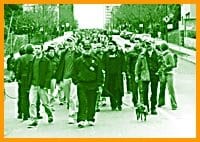A shocked Vancouver gay community is rethinking its relationship with the police, the school system and park safety in the wake of the Nov 17 slaying of Aaron Webster in Stanley Park.
Webster, 41, was found naked, bruised, bloody and dying by his friend Tim Chisholm at 2:30am on the edge of the large downtown park where many gay men cruise for sex. He died soon after the police arrived.
Based on witness reports, Vancouver police suspect three or four men attacked Webster with weapons. They are treating Webster’s death as a hate crime, motivated because Webster was gay.
They’ve received dozens of tips, but at press time, no arrests had been made.
The force’s first reaction to the murder was to warn gay men to stay away from Stanley Park, a suggestion that didn’t sit well with the more than 2,000 protesters who mourned Webster at a Nov 18 protest – the biggest such gathering in Vancouver’s history.
“I don’t want to hear [them] tell us to stay out of the parks,” says Little Sister’s Book And Art Emporium co-owner Jim Deva. The gay store has become something of a headquarters in the wake of the tragedy. “I want them to tell us how they’re going to protect us when we go into the parks.”
Two days after the protest, Insp Dave Jones, who is in charge of the West End (considered to be Vancouver’s gay neighbourhood), announced that the force would participate in yesterday’s community forum about the murder.
“We want to problem solve with the community about how we can make things safer,” Jones says. Police will look at how to protect gay men in Stanley Park without being intrusive on cruising culture, though some worry that increased police presence in parks might also result in more criminal charges against men having sex there.
Deva says the police seem to be taking some steps in the right direction, but that they need to build trust. He says the gay community, including the West End, has been starved of police patrols at the very times when gaybashings are most common.
“I know for a fact that Davie St has not been patrolled properly,” says Deva. “I think people would feel safer if they saw the police being more present and I think it would dissuade these young men in cars with clubs.”
Attention is also turning to how to quash homophobic attitudes that create potential gaybashers.
“Chances are these young men came out of the school system with this hate and this fear,” Deva says. Chances are these same young men once bullied queer students on the playground, “and chances are the teachers looked the other way.”
After the fatal beating of school teacher Kenneth Zeller in Toronto’s High Park in 1985, the Toronto District School Board developed a human sexuality program here. British Columbia has traditionally been more resistant to dealing with issues of sexual orientation in schools – at least until now.
Lorne Mayencourt, the openly gay Liberal member of the BC provincial legislature who represents downtown’s Vancouver-Burrard riding, has scheduled a meeting with education minister Christy Clark. He wants to modify the school safety kits, for example, so they’ll address homophobia alongside other forms of bullying and discrimination. And Mayencourt called for more studies: This time, a survey asking students if they feel safe in school, and if not, why not?
If schools aren’t teaching kids to become good citizens then “we need to address it – and we will,” Mayencourt says.
“I really think we should give him the benefit of the doubt and see what he does,” Deva says of Mayencourt’s efforts. “I support him 100 percent.”
James Chamberlain of BC’s Gay And Lesbian Educators (GALE) is not so supportive. He says the studies have already been done and the government’s just stalling.
Other work going on includes a proposed police database to record the names of people reported to have insulted, threatened or assaulted gay people, more resources for Vancouver’s bashline and a memorial fund for Webster. (Donations can be sent to Justice For Aaron Webster, care of Little Sister’s, 1238 Davie St, Vancouver V6E 1N3.)
Friends of Webster say he was an exceptionally caring and giving person.
“He was the nicest man I had ever met,” says neighbour Deb Weber.
Webster worked at a paint store on Vancouver’s east side, was a professional painter and an amateur photographer. He was known for his great – and sometimes dirty – sense of humour.
Friend Mark McClarty remembers the time Webster “dropped everything” to drive McClarty’s lover from Vancouver to Seattle.
“He was always the type to have a smile on his face and a willingness to give you a hug, no matter what was going on in his life,” McClarty says.
And a lot went on in his life, much of it painful. Originally from the Okanagan Valley, Webster made a point of staying away from most of his family of origin in his adult life. He developed strong friendships in Vancouver and seemed to find a chosen family among his co-op neighbours.
Friends say Webster spent most of the 1990s caring for his two lovers who died of AIDS.

 Why you can trust Xtra
Why you can trust Xtra


